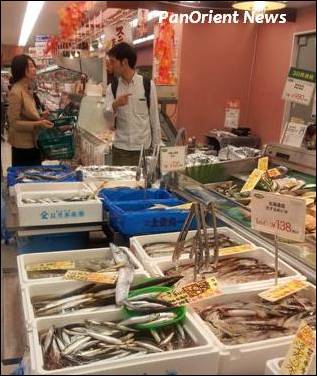|
|
Environment
Japanese Main Retailers Ranked by Greenpeace on Radiation Protection
Thursday, November 24, 2011

Tokyo- (PanOrient News) Following months of seafood contamination sampling at five Japanese retailers, Greenpeace today released a ranking guide illustrating how well each company has been responding to radioactive contamination of seafood following the Fukushima Daiichi nuclear disaster in March.
AEON, Ito Yokado, Daiei, Uny (Apita) and Seiyu were targeted, with each ranked on how they bought seafood, how their seafood was screened, how strong their standards were compared to the far-too-high Government standard of 500bq/kg, and how clearly they displayed this information to consumers.
Due to its “radiation-free” food policy announced on November 8, AEON leads the ranking, with Ito Yokado taking second place given its labeling system announced on November 21 shows fishing areas for skipjack tuna and Pacific saury sold in the greater Tokyo area.
Seiyu trails as the worst retailer in this guide, as when challenged it responded that Greenpeace’s criteria were “not needed” and that it is asking the Japanese government for enhanced food contamination screening.
Results of the survey (points out of 100) showed that AEON topped the ranking with 82 points, followed by Ito Yokado (68), Daiei (54), Uny (Apita) (46), and Seiyu (32).
“While the government must urgently improve and expand its food contamination screening, retailers cannot sit on their hands in the meantime,”said Wakao Hanaoka, Greenpeace Japan Oceans Campaigner.“Retailers play an essential role in protecting the health of their customers, as well as restoring consumer confidence in Japanese produce, as they lie at the end of the distribution channel.”
“Greenpeace’s seafood monitoring shows that even with very strict standards only a small fraction of seafood needs to be filtered out. AEON has taken action and proven this can be done – it’s time for other retailers to follow suit,” concluded Hanaoka.
Greenpeace is an independent global campaigning organization that acts to change attitudes and behavior, to protect and conserve the environment, and to promote peace.
Questionnaires were sent to the five supermarket chains from September to November 2011, with the ranking following five evaluation standards.
The first one is "Buying" criteria (the presence or absence of buying criteria, including specifics on radiation contamination.)
The second one is "Sales" criteria (the presence or absence of radiation standards better than the Japanese government’s inadequate standards, including details of contamination levels, where the fish was caught and port landed).
The third is "Radiation Measuring System" (the presence or absence of voluntary radiation screening systems for seafood.)
The fourth one is "Providing Clear Information to Consumers" (including details of contamination levels, where the fish was caught and port landed, and fishing dates not best before dates.)
The fifth evaluation standard is "Influence on the Japanese Government" (whether or not they have asked the government to enhance its food screening and to provide information/results to the public.)
PanOrient News
© PanOrient News All Rights Reserved.
|
|

